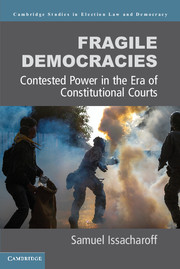Introduction: The Burden of Modern Democracy
Published online by Cambridge University Press: 05 July 2015
Summary
A quarter century has passed since the fall of the Berlin Wall. The initial throes of the twentieth-century defeat of communism and fascism invited the triumphant claim that the sweep of democracy was indeed upon us. As even the Arab protesters from Cairo to Tunis would show, seemingly impervious autocratic regimes could succumb to long nascent aspirations for popular governance. The wave of embryonic democratic transitions that began with the fall of the Soviet Union was indeed a heady time. History may not have ended with the fall of democracy's ideological rivals. But the arc of history appeared decisively tilted toward democracy.
Today the assessment is more mixed. Democracy turns out to require more than just holding an initial election for head of state. The rule of law cannot be commanded by a text but needs institutional guarantors. Political parties need to learn the give and take of electoral coalitions and the difficult translation of a party platform into a program for governance. There must be confidence that the rules of the game are relatively fair and that the losers of today can emerge as the potential winners of tomorrow. Perhaps most of all, there has to be some assurance that there will be a chance to reconsider tomorrow, that the winners of today will be willing to surrender office tomorrow as the tides of public opinion and electoral support may shift.
To look around twenty-five years after the end of the Soviet Union is sobering. The initial flirtations with democracy in the former Soviet republics of Central Asia collapsed into autocratic rule. The Green Revolution in Iran was suppressed, as was the Bahraini uprising. The civil war in Syria, at the time of this writing, rages on. In Egypt mass protests, street violence, ethnic conflict, and political instability continue, with the military now once again in power. Libya remains a cauldron of political unrest with even rudimentary public authority deeply contested.
- Type
- Chapter
- Information
- Fragile DemocraciesContested Power in the Era of Constitutional Courts, pp. 1 - 14Publisher: Cambridge University PressPrint publication year: 2015

